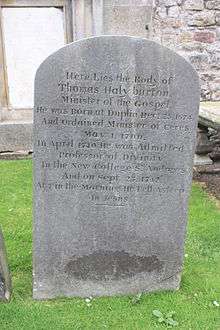Thomas Halyburton

St Andrews Cathedral churchyard
Rev Prof Thomas Halyburton (25 December 1674 – 23 September 1712) was a Scottish divine.
Life
Thomas Halyburton was born at Duplin, near Perth on Christmas Day 1674. His father, Rev. George Halyburton, had been a minister in the Church of Scotland but was ejected for adherence to the principles of the Covenanters. In 1676 the Privy Council of Scotland denounced the former minister for holding conventicles (church services in the open air, unauthorised by the established church and outlawed by the government). George died that same year, and in 1685 his wife moved the family to Rotterdam to avoid the fierce persecution which was carried out against the Covenanters.[1]
In Rotterdam young Thomas was educated in the school founded by Erasmus. Following the Glorious Revolution, he returned to Scotland and continued his education in Edinburgh.
After a period of inner struggle with the philosophy of Deism, Halyburton returned to the faith of his father. On completing theological training, Halyburton graduated from the University of St Andrews in 1696. He was licensed to preach in the Church of Scotland by Queen Anne, and ordained to the ministry of the church in Ceres, Fife in 1700. The church was part of the presbytery of Kirkcaldy.
After serving the church in Ceres for ten years, Halyburton became Professor of Divinity at St Mary's College, St Andrews.[1]
He died two years later at the age of 37, following an illness. His body was buried in St Andrews Cathedral next to Rev. Dr. Samuel Rutherford.[1]
Legacy
Thomas Halyburton’s theological and apologetic writings are marked by a distinctive thoroughness. The surviving scripts of his sermons show him to have been richly theological, deeply experimental (i.e. dealing with the experiences of the soul) and very practical — a master of the classic Puritan style of preaching.[2]
The extant writings of Rev. Thomas Halyburton were all published after his death:
- Natural Religion Insufficient, and Revealed Religion Necessary, to Man's Happiness in his Present State (1714), an able statement of the orthodox Calvinistic criticism of the deism of Lord Herbert of Cherbury and Charles Blount
- Memoirs of the Life of Mr Thomas Halyburton (1715), three parts by his own hand, the fourth from his diary by another hand
- The Great Concern of Salvation (1721), with a word of commendation by Isaac Watts
- Ten Sermons Preached Before and After the Lord's Supper (1722)
- The Unpardonable Sin Against the Holy Ghost (1784)
John Wesley and George Whitefield often referenced Halyburton's writings in their sermons.
References
- Halyburton's Memoirs (1714)
 This article incorporates text from a publication now in the public domain: Chisholm, Hugh, ed. (1911). "article name needed". Encyclopædia Britannica (11th ed.). Cambridge University Press.
This article incorporates text from a publication now in the public domain: Chisholm, Hugh, ed. (1911). "article name needed". Encyclopædia Britannica (11th ed.). Cambridge University Press.